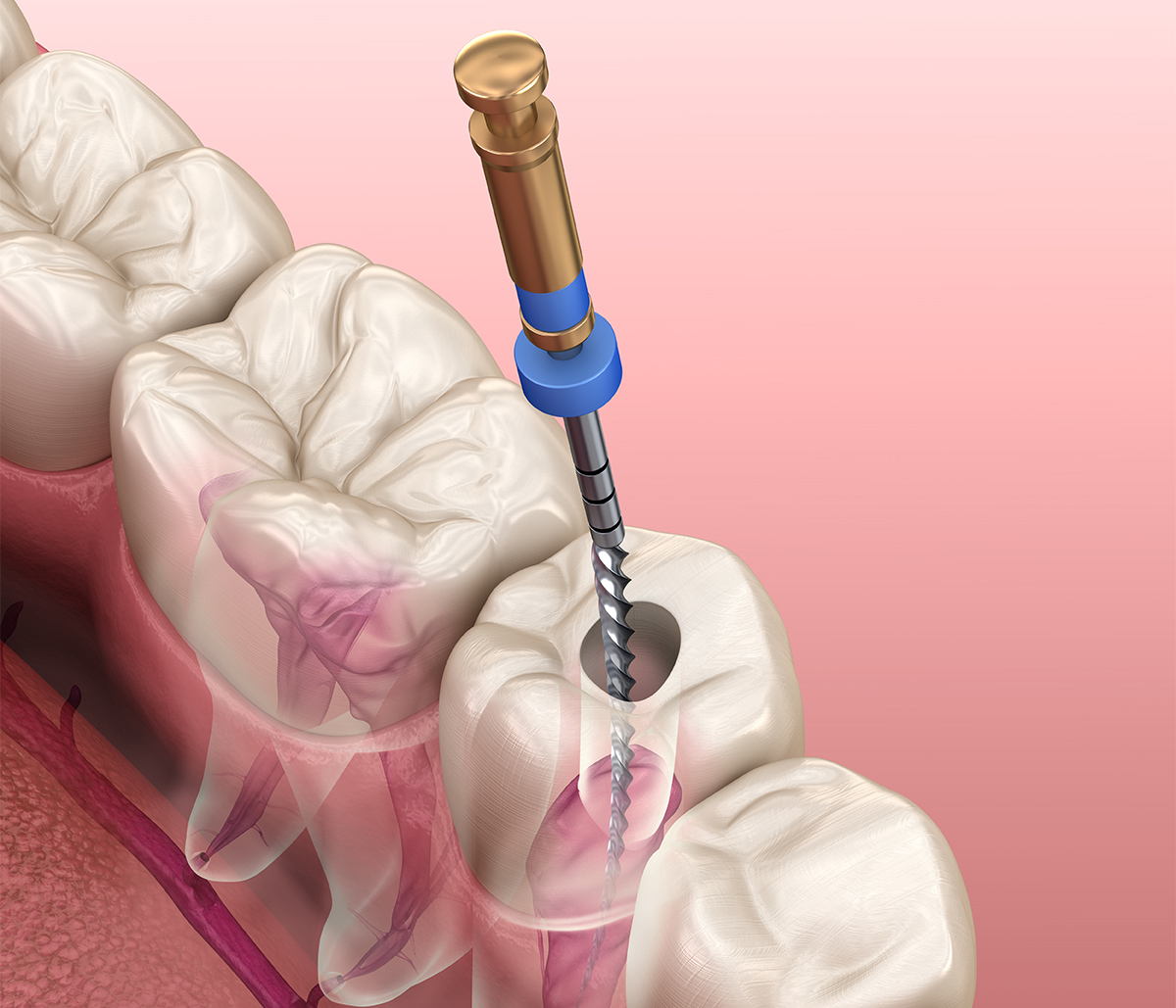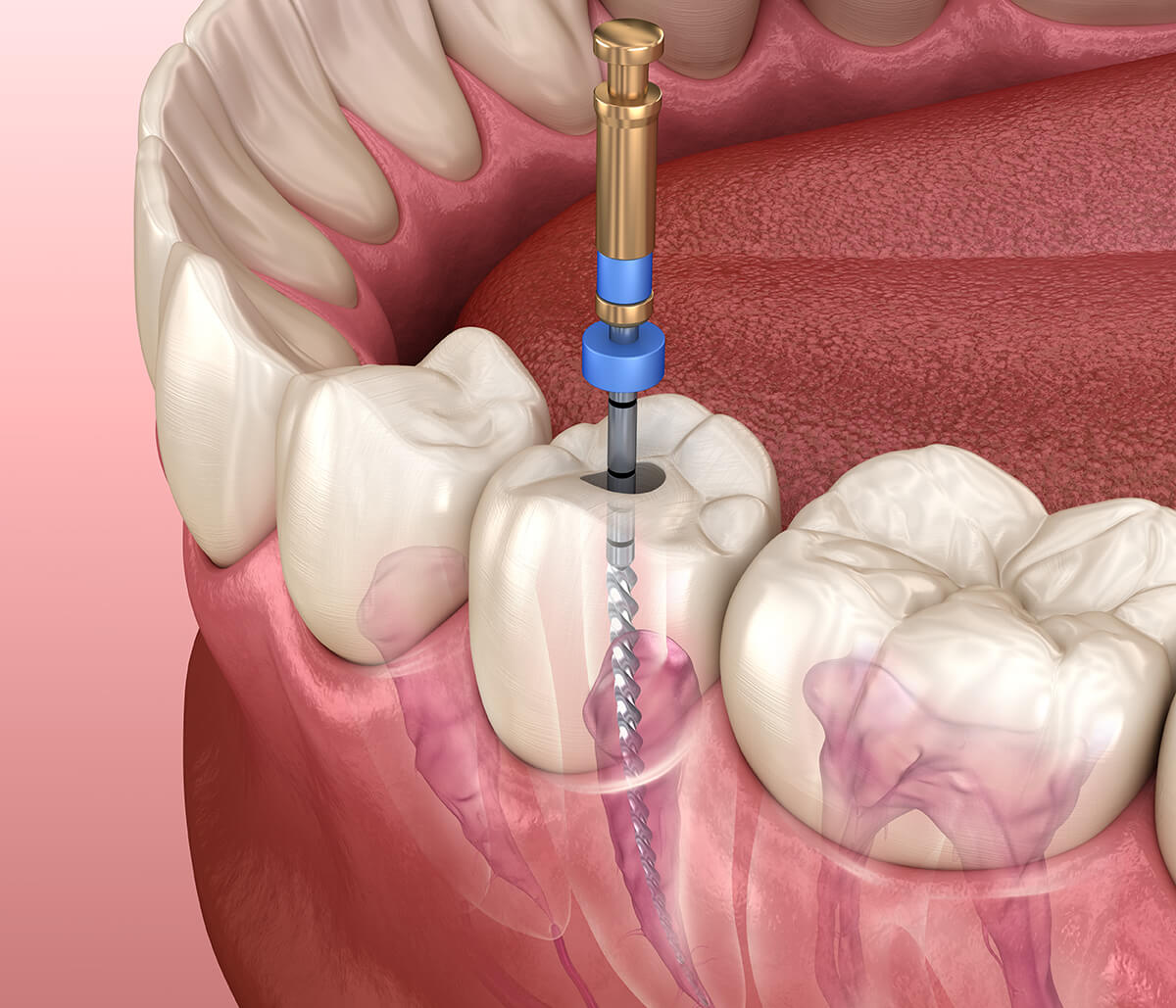Root canals – save your tooth and retain your beautiful smile
When it’s found that a tooth has severe decay, a root canal is one option available that will allow the tooth to be saved. There’s no need to be worried if this procedure is prescribed to treat the damaged and diseased tooth. Millions of teeth are saved through this procedure each year. Triad Dentistry has provided this procedure for years in a stress-free and comfortable environment. The doctors and the caring, well-trained team strive to provide the highest level of quality dentistry for patients in the Greensboro, NC area.
What is a root canal?

Within your tooth, underneath the dentin and enamel, lies a soft tissue called pulp. The pulp within a tooth consists of connective tissue, blood vessels and nerves, all of which aid the growth of your tooth’s root during its development. Once a tooth is fully developed, it can survive without this pulp because it will continue to be nourished by surrounding tissue.
During a root canal, this pulp and nerve tissue are removed, followed by cleaning and sealing the tooth. The term “root canal” is used to describe the natural cavity within the center of the tooth where this pulp and nerve tissue are removed. Without treatment, a tooth’s tissue can become infected causing abscesses to form.
Tooth pulp – why does it need to be removed?
When the pulp or nerve tissue becomes damaged inside a tooth, it begins to break down allowing bacteria to multiply within the pulp chamber. This can lead to an infection of the tooth and/or an abscessed tooth (a pocket that forms at the end of a tooth’s root, which can fill with pus). An infection or abscess can lead to:
- Bone loss at the tip of the tooth’s root
- Swelling, which can spread to the face, head or neck
- A spreading infection
Root Canal Procedure without pain – Triad Dentistry

Reasons for root canal treatment
A root canal may need to be performed when the pulp becomes inflamed or infected. Some other reasons for a root canal may include:
- Chip or crack in your tooth
- Deep decay
- A history of repeated dental procedures on the same tooth
- Defective crown
Additionally, an injury to a tooth (even one that results in no visible chips/cracks) may damage pulp. If pulp infection goes untreated, it is likely that there will be noticeable pain and it can lead to an abscess.
Relieve Pain & Save Natural Tooth With Root Canal Greensboro

Symptoms of a root canal infection
If you are experiencing any of the following symptoms, you may need a root canal:
- Severe tooth pain or toothache
- A darkened or discolored tooth
- Tooth pain when biting/chewing food
- Increased tooth sensitivity to cold or heat
The need for a root canal, if not detected early, will present itself (very often) through significant pain in the tooth, so the infection shouldn’t go unnoticed for long. If you experience any pain or symptoms as presented above, you should call Triad Dentistry immediately to schedule an appointment.
Painless root canal procedure
When a patient thinks of a root canal procedure, it most likely induces stress and anxiety for them. The doctors at Triad Dentistry want the experience to be as pain-free as possible using local anesthetics. Once the area is numbed, an access point will be made in the tooth so that the pulp chamber is exposed. Using sterilized and safe instruments, the doctor will clean out the infection by removing the pulp from the tooth before cleaning and disinfecting the canal. He/she will then fill the canal and seal it and, depending on the situation, may choose to crown the tooth for extra protection. The dental crown is made in-house using a CEREC machine and may be placed during the same appointment the root canal was performed.
Benefits of root canal treatment
There are several benefits of a root canal procedure, including:
- Pain relief – the purpose of the root canal procedure is to remove the infection from within the tooth. This will end the pain you’ve been experiencing!
- Protection – If an infection is left untreated, it’s very likely it will spread to other teeth. A root canal procedure, through removal of the infected tissue, will halt any potential of the infection spreading.
- Hygiene – A root canal will not only rid your tooth of the lingering infection but, through the treatment, will also aid in removing any other potentially damaging bacteria that may have been lingering.
- Saves the tooth – One of the primary purposes of a root canal procedure is to remove the infection so that the tooth can be saved. If left untreated, it’s very likely that the tooth will have to be removed.
FREQUENTLY ASKED QUESTIONS

Dr. Steven Hatcher

Dr. Chad Merrell

Dr. Sona Isharani

Dr. Victoria Santiago-Coiro
It’s important to take tooth pain or aches very seriously, as they could be symptoms of more serious problems. For an experience that will leave you comfortable and at ease, please give Triad Dentistry a call today at (336) 383-1482 to set up an appointment.






